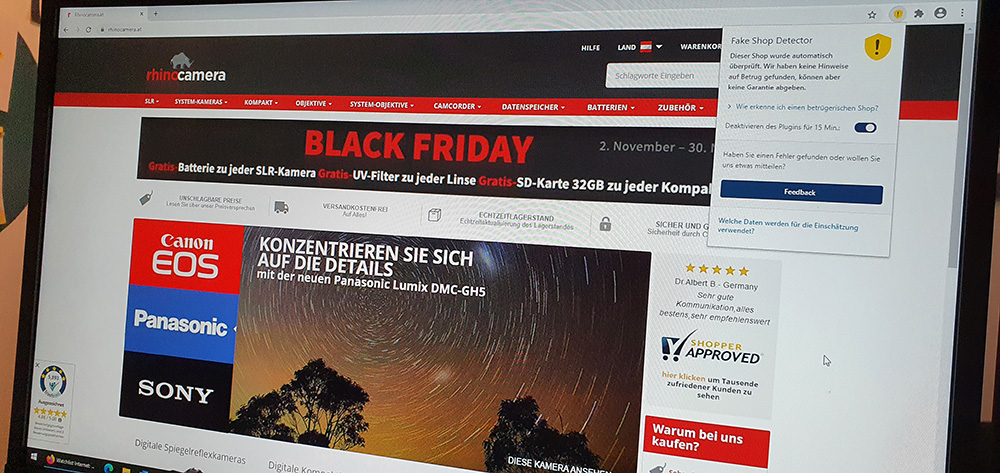Credit: ÖIAT
According to Helmut Leopold and Ross King, two AI experts at the AIT Austrian Institute of Technology, we should not be afraid of artificial intelligence, and instead see it as an opportunity to help people and enable them to work more efficiently. One example of AI in practice is the fake shop analysis tool developed by AIT to make the internet safer for consumers.
Fake payment demands, hacked passwords, extortion emails and links which lead to the installation of a computer virus: whatever form cybercrime takes, it always causes harm. There has been a rapid growth in cybercrime over the last few years: 4,000 cases were registered in Austria in 2010, but by 2019 this figure had risen to 28,000. The COVID-19 pandemic has only served to fuel this development. Around 36,000 cases of cybercrime were registered in 2020, representing a 22% increase over the previous year. Helmut Leopold and Ross King, AI experts at the AIT Austrian Institute of Technology, believe that ecommerce fraud is an important and to date largely ignored aspect of this phenomenon. Goods ordered from fake shops online are either never delivered, or as counterfeit goods. Although experts can recognise fake websites on an individual basis, there are simply too many to manage: “Some fake shops are only online for 48 hours, but still cause huge financial damage within this short period,” explains Helmut Leopold, Head of the Center for Digital Safety & Security at AIT.
Fake-Shop Detector evaluates 22.000 factors
As Austria’s largest non-university research institution with around 1,400 employees, AIT operates at the interface between science, business and the public authorities. Developing and applying AI requires intensive dialogue and cooperation between all these sectors. A special initiative to enhance security in ecommerce has been started with co-financing from KIRAS – the Austrian Security Research Programme run by the Federal Ministry of Agriculture, Regions and Tourism (BMLRT) which promotes cooperation between the authorities, industry and research institutions. The fake shop detector developed by Ross King, Head of the Data Science & Artificial Intelligence research group at AIT, and his team is a perfect example of a project involving all these groups: the tool uses artificial intelligence to compare the programming code behind suspicious websites with that used by known fake shops to identify coding similarities. This approach is effective because fake online shops are often similar in format – the operators simply copy the code and use it to establish new fake shops. Where the probability of a website being a fake shop is low, the tool displays a green light in the browser – but where this probability is high, the signal indicates red. The fake shop detector examines websites in close detail, including more than 22,000 factors in its assessment. Between July 2020 and January 2021, the tool was used to evaluate around 17,500 websites for existing risk indicators; the tool achieved an average 90% agreement with the assessments made by experts, indicating its suitability as a tool for helping consumers decide whether to continue with their online purchase. It was jointly developed for end consumers together with the Austrian Institute for Applied Telecommunications (ÖIAT) and Austrian SME X-Net Services GmbH.
Browser Plugin protects customers
“It works both in Firefox and Google Chrome browsers, and will soon be available free of charge from the Google store as a browser plug-in,” says AIT Data Scientist Andrew Lindley who is leading the underlying research projects. He adds: “As well as real-time protection for consumers, it also adds significant value by directly strengthening regional, national and European businesses engaging in ecommerce. The tool will therefore be further developed as part of the MAL 2 research projects (funded by the Austrian Federal Ministry of Climate Action, Environment, Energy, Mobility, Innovation and Technology, BMK) as part of the sixth Call of the “ICT of the Future” research programme run by the Austrian Research Promotion Agency (FFG) and by the KIRAS-sponsored SINBAD project.
Definition of AI
Opinions on the definition of AI are divided: “You can ask six experts and get six different answers,” says Ross King. Helmut Leopold clarifies: “The difference between conventional algorithms and artificial intelligence is that algorithms behave the way the development team has stipulated, so that all the results are predictable. However, artificial intelligence is based on neural networks, hence this is no longer the case.” It is for precisely this reason that new approaches are needed for the testing and verification of AI systems, including guarantees that the AI systems behave strictly according to the defined specifications, and that they observe legal and ethical rules for technology. Consequently, new areas of research such as the testing of AI systems are important starting points for AIT. Helmut Leopold is clear that AI should not be demonised: “Society needs to engage in a substantial, fact-based and targeted discussion which involves all stakeholders. Ultimately, these are tools we can use to improve our lives. There is no need for fear.” Ross King adds: “Technology itself is always neutral – the ethical responsibility lies with humans as to how and where AI is used.”
(Translated from Original Article, Author: Forbes Dach / 16.04.2021)



